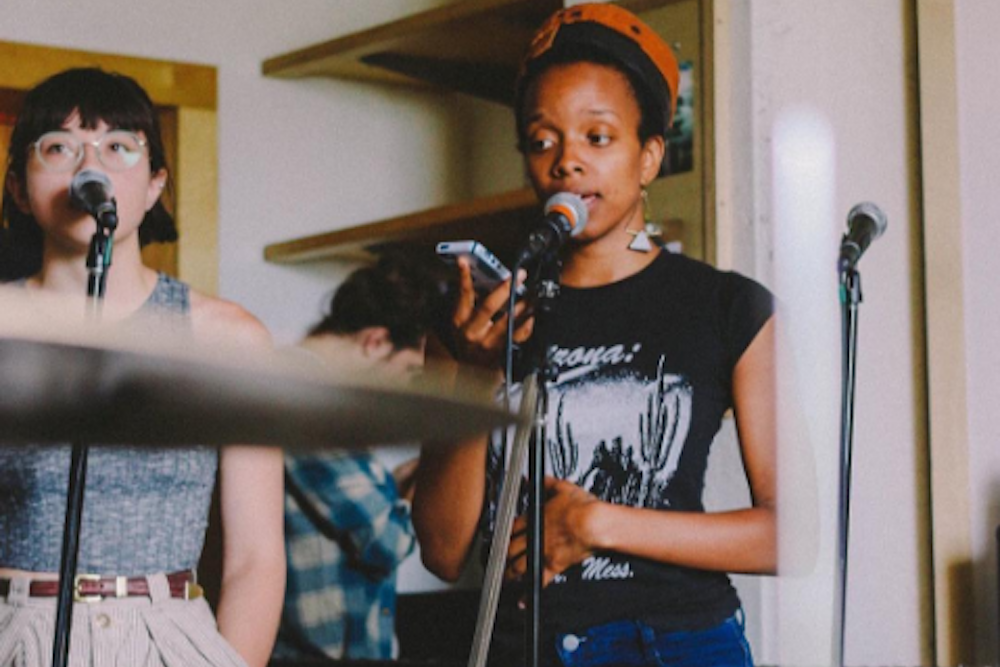The literary organization Young Chicago Authors lists a pretty simple but powerful mission statement on its website: To transform “the lives of young people by cultivating their voices through writing, publication, and performance education.” One way the organization has accomplished that goal is through WordplayYCA, a long-running open-mic series where many of Chicago’s brightest wordsmiths got their start. Chance the Rapper was doing poetry there before becoming rap’s most amicable gospel spitter. Mick Jenkins was a WordplayYCA MC, too, before gaining a national following with his conscious raps and baptismal imagery.
Their stories aren’t just a good look for YCA, but, more crucially, also for the city of Chicago — a diverse cultural center whose violent narrative is often broadly painted by those with little emotional and familial attachment to the city. Artists like Donnie Trumpet and Chance, Jenkins and Noname perform with a fire that reminds outsiders of the humanity that thrives throughout the Windy City’s streets.
As the associate director at YCA, Jamila Woods doesn’t have all that much time to celebrate the recent release of her translucent debut, Heavn. But she makes the most of that spotlight, revealing herself to be a poet who’s as complicated as she is relatable. Woods solemnly protests police brutality on songs like “VRY BLK” (where she ponders, “If I say that I can’t breathe, will I become a chalk line?”) and readily comes clean about her insecurities on “Lonely Lonely.” She’s a soulful woman on record, partially because her mission demands it: emphasizing the preciousness of young African-Americans’ stories.
The singer and poet — who first gained wide exposure from her contribution to the Social Experiment’s Surf highlight, “Sunday Candy” — hopped on the phone to talk with SPIN about her first solo effort, the troubled social circumstances surrounding it, and how her moment in the sun doesn’t only belong to her.
On “Lonely Lonely,” you have a lyric that says, “Put a post-it note on my mirror so I might love myself today.” Is that supposed to be an image of a black girl in a room, or is that your own point of view?
That’s just myself. I think a lot of people, in general, have whatever mechanisms they have in order to go through the day. For me, I do just literally have post-it notes and other little messages to strengthen me on hard days, or just on regular days, to remind me — to remind ourselves — of our dopeness.
Would you say that’s a form of protest in itself?
I think so. I wish that more people, especially young people, were taught about self-love at a younger age. When you’re little, you know about love: You know about the idea that you’re supposed to find someone to love. We’ve got a basic idea, but — at least when I was young — no one really exemplified that what really comes first is loving yourself, and [how] that’s the foundation of any other kind of love, and how hard it is to do that.
What’s the meaning behind the cover art to Heavn? Is it about the baptismal effect of water?
I say on the song “LSD” that I felt like Lake Michigan and the beaches in Chicago are my favorite places because it’s so beautiful and free. And it’s free to go — everyone is in the same place, nearly naked, enjoying the sun together. It’s kind of the most democratizing place in a really segregated city, and I love how people who aren’t from here just appreciate the beauty of that.
There’s a little bit of photo editing done [on the album cover], but even in the original photo, [the Chicago beach] looks almost like a tropical island, because the photos are so beautiful, and there’s so much natural beauty in Chicago. That’s not something Chicago’s really known for and I wanted to include that.
And also: Yeah, you’re right like about [the baptismal imagery]. The good things about Chicago save me on a daily basis, like getting to work with my students, seeing a beautiful part of the city, or seeing the people that I love. So it is kind of a baptism in that way.
That’s an interesting idea, though. Can’t gentrify water.
Yeah, I mean they probably could. They’re probably going to figure out a way.
Joey Purp, Vic Mensa, Towkio, and Chance the Rapper have all dropped their projects, and Mick Jenkins’ new album is supposed to be coming soon. How does it feel to have your debut alongside this wave of Chicago artists?
It feels really good. A lot of us came up going to some of the same open-mic spaces so it feels like an extension of that. I’ve seen Chance and the Social Experiment build their own careers in the way that’s most authentic to them. You look at Vic and Noname and everyone has their own path. I think that’s a cool thing for Chicago — and younger people who’re still going to open mics — to see that there’s no one way to be successful, and there’s not one way to make good music.
Would you consider that multiplicity of black voices a key part of WordplayYCA’s success?
Yeah, multiplicity is one thing, and also just the idea of telling your own story. I still work there, and I still teach poetry to kids all the time, and we talk a lot about how you’re the expert of your own story, and of your own experience. No one can tell your story better than you. People will try to talk all crazy s**t about young black people, and young people of color in Chicago, and it’s important that people tell their own stories.
Is it difficult trying to balance emboldening these young artists with working on your own projects?
Sometimes, yeah, [because] of the hours in the day. But it also refuels me a lot, because I think if I was just in the studio or doing my own writing all the time, I would run out fuel, or be like, “Why am I even doing this?” I think surrounding myself with young people and just being a part of a community is one of my main sources of inspiration.
https://w.soundcloud.com/player/?url=https%3A//api.soundcloud.com/tracks/273147102&color=ff5500&auto_play=false&hide_related=false&show_comments=true&show_user=true&show_reposts=false
Last week, when you released “LSD,” you said in the press release that it represents a “complicated love” of Chicago. Could you elaborate?
I feel like it’s hard when like there’s not a lot of intricacies or thoughtful reporting about Chicago, and it’s usually just the same thing: “Oh, Chicago’s so violent.” Or people saying Chi-Raq who aren’t from here.
Labels erase why we have issues in the first place, and how our government just really doesn’t care about the people in those places. So it gets kind of hard to be like, “Chicago’s the best place ever, you know? It’s so beautiful,” because there’s so much that is wrong here, and a lot of bad things that are happening. That’s why I say “complicated,” because I want to celebrate the people and the places that I love here, but not without acknowledging what’s happening. There needs to be a different narrative than the one that’s being fed to us over and over again. There needs to be a more complete narrative that includes the structural issues that are contributing to the violence that happens in Chicago.
Chance the Rapper and Kanye West’s recent work has been heavily influenced by gospel. Do you ever wonder if the gospel influence alienates non-believers?
I don’t really think of that. What I learned from church was less about religion and more about community, the power of love, and also storytelling. There’s a woman from my church I grew up going to who drove me to SAT prep class everyday, and paid for me to be able to go. I think that was because of the community that’s built. She’s not related to me in any way. She just loved my grandma and therefore loved me.
I’m not trying to exclude someone who has a different belief set. I think that music is powerful enough to transcend those differences, because I have friends of all different religions and I think that music is inclusive in that way.
Were there mixed feelings about releasing your album amid all of the police-brutality horrors happening last week?
One of my songs was actually supposed to come out on the day that Alton Sterling was killed, and I was like “Okay, I don’t want to release it today,” because I literally had no interest in talking about it or talking about anything. Next, [Philando Castile] was killed. At that point, [I thought], “What does it matter? This could happen at any day.” I knew that was true already, but I think for a lot of people, it was a blatant, slap-in-the face reminder that this happens every day, and will continue happening every day until something is changed. It’s important to remember that it’s okay to experience a range of emotions, and allow yourself to still have moments of joy and moments of peace and respite from mourning or feeling that pain.
I really love the #carefreeblackkids hashtag. Twitter in general provides a really interesting [service for] seeing where everyone’s at. A lot of my friends were like, “You know, I’m just trying to work out, get my selfie game on” — you know, to try to get over it. Some people are protesting and everyone has their way of making it through, and I don’t want to judge that. There should be room for that.
Since a lot of your material is focused on the struggle of people of color, is there a disconnect with white listeners, even if they want to sympathize? [Ed. Note: Woods was featured on Macklemore’s “White Privilege II.”]
I write specifically thinking of people of color and black people and black girls, but it doesn’t mean that my music is not listenable or for other people, too. When you allow yourself as an artist to be very specific, it’s like providing a portal for someone else to look inward. I think that makes [the music] even more universal.
Maybe they relate to something that they didn’t expect to because they might be very different from me. I have two songs on there about my granddaddy who had dementia. That’s a song that anyone can relate to, and conversely, the first song [“Bubbles”] is very much about growing up as a shy black girl, and maybe some people will relate to that. Maybe it’s just like, “Damn, that was a really cool song and story. I feel like I saw something.” And all of that is valuable to me.





